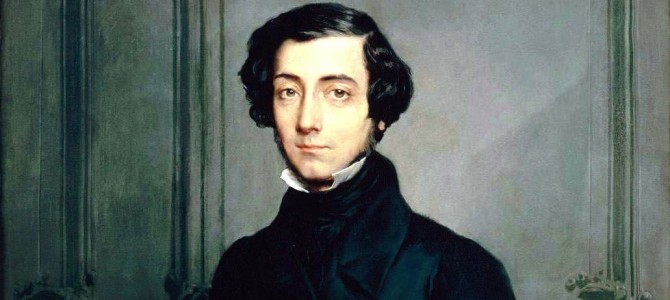In his remarks at the White House today during the state visit of French President François Hollande, President Obama curiously referenced “Alex” De Tocqueville. Here’s the video (click the speaker in the upper left-hand corner of the video for sound):
It’s an interesting choice, given how much Tocqueville has to tell us about the world – and the Obamacare economy – we inhabit today. His critique of socialism during the Second Republic, in context, transitions beautifully to the modern day debate over Keynesian projects and the entitlement state. As the introduction notes, “The new republic believed that the unemployment problem which was plaguing Paris could be solved by setting up government work-projects, guaranteeing employment at a certain wage rate for all who desired it”. Tocqueville even makes reference to why the American democracy he wrote about would never consider socialism. He even argued against a false understanding of inequality which led to socialist calls for more redistribution:
“Democracy extends the sphere of personal independence; socialism confines it. Democracy values each man at his highest; socialism makes of each man an agent, an instrument, a number. Democracy and socialism have but one thing in common—equality. But note well the difference. Democracy aims at equality in liberty. Socialism desires equality in constraint and in servitude.”
This passage is apt as well, on the danger of a government which provides too much, and in the name of the best interests of a people, seizes away our liberty. But this passage of his represents perhaps the best response you’ll ever read to Obama’s approach to governance:
What good does it do me, after all, if an ever-watchful authority keeps an eye out to ensure that my pleasures will be tranquil and races ahead of me to ward off all danger, sparing me the need even to think about such things, if that authority, even as it removes the smallest thorns from my path, is also absolute master of my liberty and my life; if it monopolizes vitality and existence to such a degree that when it languishes, everything around it must also languish; when it sleeps, everything must also sleep; and when it dies, everything must also perish? There are some nations in Europe whose inhabitants think of themselves in a sense as colonists, indifferent to the fate of the place they live in. The greatest changes occur in their country without their cooperation. They are not even aware of precisely what has taken place. They suspect it; they have heard of the event by chance. More than that, they are unconcerned with the fortunes of their village, the safety of their streets, the fate of their church and its vestry. They think that such things have nothing to do with them, that they belong to a powerful stranger called “the government.” They enjoy these goods as tenants, without a sense of ownership, and never give a thought to how they might be improved. They are so divorced from their own interests that even when their own security and that of their children is finally compromised, they do not seek to avert the danger themselves but cross their arms and wait for the nation as a whole to come to their aid. Yet as utterly as they sacrifice their own free will, they are no fonder of obedience than anyone else. They submit, it is true, to the whims of a clerk, but no sooner is force removed than they are glad to defy the law with the spirit of a defeated enemy. Thus one finds them ever wavering between servitude and license. When a nation has reached this point, it must either change its laws and mores or perish, for the well of public virtue has run dry: in such a place one no longer finds citizens but only subjects.
That’s from Democracy in America, Vol. 1, Part 1, Chapter 5, translated by Arthur Goldhammer.
Of course, Tocqueville’s views were not without controversy at the time. They still are in some corners.
Given @bdomenech‘s tweeting over the last 10 minutes, he seems to think we live under a 19th century monarchy.
— Jeff Spross (@jeffspross) February 11, 2014
@jeffspross No, we’ve got the phone to go with the pen now.
— Ben Domenech (@bdomenech) February 11, 2014









